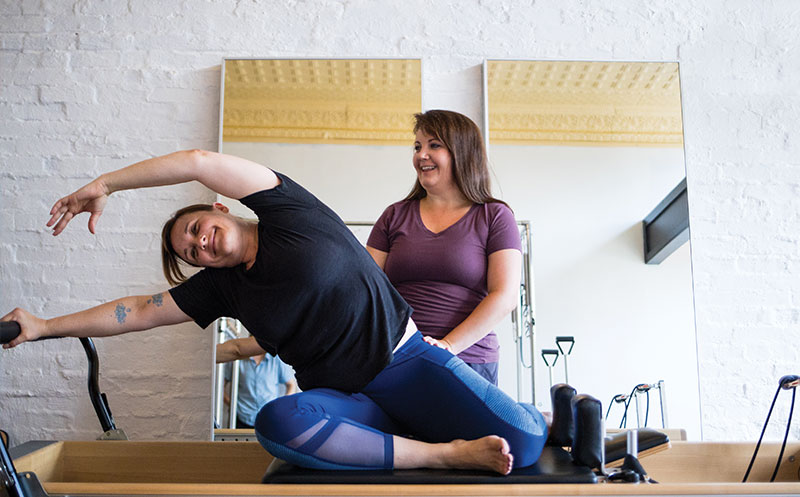Alumna uses diverse background to help people heal from the inside out
By Patricia O’Dell
Earning degrees in dance, psychology, and counseling and guidance with a minor in gender and women’s studies may sound like a meandering path to a career, but alumna Lauren Thompson (B.F.A. ’09, B.A. ’09, M.A.’12) knew she could make all of her interests come together. And today, with experience ranging from large-scale art installations to federal inmate counseling, she has clearly succeeded.
Thompson’s unique brand of wellness comes together at her Pilates studio, Thrive Pilates, in Kansas City’s Westside. But her work goes far beyond what happens in that cozy space. The connections she makes with her clients are aimed at benefitting the whole person — not just their body composition.
So many interests, so little time
Thompson will be the first to tell you: It wasn’t exactly a straight path to her current line of work.
“In high school I really wanted to end up on Broadway,” Thompson says with a laugh. “But when I was accepted to the Conservatory, my parents made a deal with me. They would pay for college if I got another degree. I’d gotten interested in psychology in high school, and even though I didn’t know what I could do with that it, I chose dance and psychology.”
Thompson says people were often skeptical when they learned she was pursuing such different courses of study. She got the same question many college students get when selecting a major (or two) without a crystal-clear job description: “What are you going to do with that?”
Anyone asking that question hadn’t realized the connection between mind and body, she says, “but I was living it. It was so clear to me how those degrees worked together. Eventually, everyone else caught up.”
As an undergraduate at UMKC, Thompson would dance for six hours a day, then go to her psychology classes. Along the way, she also decided to get a minor in gender and women’s studies. And she didn’t stop with her undergraduate degrees. A year after graduation, she was back at UMKC, pursuing her master’s in counseling and guidance, with a focus on mental health.
Around this time, Thompson started teaching Pilates and yoga classes, a way to combine her backgrounds in dance and psychology that would turn out to be a crucial thread through
her many work experiences.
Over the next several years, she finished her master’s degree and completed an internship working with people with eating disorders. She thought she might enjoy a career in women’s health. Then, the recession hit.
When she was offered a job working with sex offenders in maximum security at Lansing Correctional Facility in Leavenworth County, Kansas, she took it. Though that job
offered many challenges, Thompson calls it a “blessing” — just another step on the path to where she is today.
Making her own way in the wellness world
During this time, Thompson was teaching and exercising less, usually taking only one yoga class a week. She was frustrated that she wasn’t moving her body more, so she put formal counseling aside and went back to teaching yoga and Pilates full-time. But even the studios where she taught brought some frustration.
“I couldn’t really teach the way I wanted to teach,” she says. “And I couldn’t control the messaging, which I am hypersensitive about because of my knowledge of mental health.”
She realized it was time to open her own studio, incorporating her wide range of training and experiences. She wanted to meet the multifaceted needs of women from both physical and mental health perspectives, and her diverse background gave her the skills she needed to do it.
“One of the things that we address is that a lot of exercise and training is developed for the male body. That can be a problem for a number of reasons,” she says. “It’s not as if women can’t do these things, but there are times when many exercises are not appropriate.”
Thompson notes that the constant physical fluctuations of women’s bodies — menstruation, pregnancy and menopause — deserve acknowledgement in the wellness world.
“Men’s health is relatively linear. They don’t experience the same kind of cycles that women do,” Thompson says. “We know that girls playing soccer experience significantly more ACL tears correlating with menstruation. It’s similar to the hormones from pregnancy that cause joints to be less stable.”
In addition to being in tune with individual physical needs, Thompson pays close attention to her language.
“The idea of ‘skinny equals healthy’ is false, and that mentality is mostly what we hear from the fitness industry,” she says. “I think it’s shame-based, and shame-based motivation never works. Intensity is not going to treat you well.”
Thompson practices the balance that she preaches. While work is important to her, she is active in the Kansas City arts and dance communities, using her Conservatory training to choreograph and participate in collaborative art projects. She also works on zoning and development issues in her Westside neighborhood, which has become popular with developers.
While managing her work in wellness, art and community development, Thompson works hard to stay healthy and grounded.
“I think the important thing is to not compare yourself to other people. There’s so much wasted energy for women on comparing. I feel lucky that I had the training early to help me block that.”

